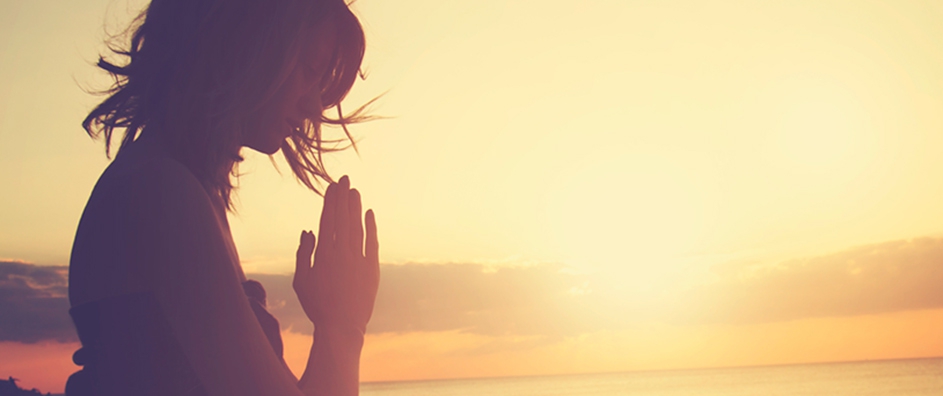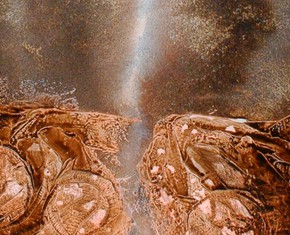The views expressed in our content reflect individual perspectives and do not represent the authoritative views of the Baha'i Faith.
Meditation is the key for opening the doors of mysteries. In that state man abstracts himself: in that state man withdraws himself from all outside objects; in that subjective mood he is immersed in the ocean of spiritual life and can unfold the secrets of things-in-themselves. – Abdu’l-Baha, Paris Talks, p. 175.
Prayer and Meditation, take much time for these two. – Abdu’l-Baha, Star of the West, Volume 9, p. 86.
…the core of religious faith is that mystic feeling which unites man with God. This state of spiritual communion can be brought about and maintained by means of meditation and prayer. – Shoghi Effendi, letter to an individual Baha’i, December 8, 1935.
The Baha’i teachings encourage everyone, regardless of their religion or lack of one, to gradually awaken and nourish the mind, the heart and the soul through a regular practice of meditation and prayer.
You’ve heard the old saying: use it or lose it. The systematic, daily nature of a consistent spiritual practice of prayer and meditation has the same kind of effect on the soul that daily exercise has on the body. We all know that exercise—whether working out at the gym or taking a brisk walk or lifting weights—doesn’t do us much good if it only occurs once a month, or once a year. Exercise has to happen regularly in order to have any real, lasting benefit. In the same way, a regular commitment to a spiritual practice of mindful meditation and prayer can keep our souls in contact with the eternal, mystical reality, and can develop the true strength of our spirit:
I pray in your behalf that your hearts may be enlightened with the light of the love of God; that your minds may develop daily; that your spirits may become aglow with the fire and illumination of His glad tidings, until these divine foundations may become established throughout the human world. – Abdu’l-Baha, The Promulgation of Universal Peace, p. 66.
There is nothing sweeter in the world of existence than prayer. Man must live in a state of prayer. The most blessed condition is the condition of prayer and supplication. Prayer is conversation with God. The greatest attainment or the sweetest state is none other than conversation with God. It creates spirituality, creates mindfulness and celestial feelings, begets new attractions of the Kingdom and engenders the susceptibilities of the higher intelligence. – Abdu’l-Baha, Star of the West, Volume 5, p. 41.
When we develop this kind of sustained mindfulness, the Baha’i teachings say, we open the door to a connection between our souls and the Creator:
The wisdom of prayer is this: That it causeth a connection between the servant and the True One, because in that state man with all heart and soul turneth his face towards His Highness the Almighty, seeking His association and desiring His love and compassion. The greatest happiness for a lover is to converse with his beloved, and the greatest gift for a seeker is to become familiar with the object of his longing; that is why with every soul who is attracted to the Kingdom of God, his greatest hope is to find an opportunity to entreat and supplicate before his Beloved, appeal for His mercy and grace and be immersed in the ocean of His utterance, goodness and generosity. – Abdu’l-Baha, Baha’i World Faith, p. 368.
You can bring about and maintain that mystic feeling which unites us with God by sustaining a consistent practice of prayer and meditation. So if you don’t already do that on a daily basis, try starting today. Just spend a few minutes by yourself, quietly generating the inner reflection and serenity that can bring about a prayerful state. If you only do this occasionally, try making it a regular habit. You’ll find that it has an enormously powerful and positive effect on your mind and your soul.
Whatever you do, though, don’t overdo it. The Baha’i writings say that prayer should never be too lengthy, burdensome or oppressive—that instead, it should lighten and enlighten the soul:
Pride not yourselves on much reading of the verses or on a multitude of pious acts by night and day; for were a man to read a single verse with joy and radiance it would be better for him than to read with lassitude all the Holy Books of God, the Help in Peril, the Self-Subsisting.
Read ye the sacred verses in such measure that ye be not overcome by languor and despondency. Lay not upon your souls that which will weary them and weigh them down, but rather what will lighten and uplift them, so that they may soar on the wings of the Divine verses towards the Dawning-place of His manifest signs; this will draw you nearer to God, did ye but comprehend. – Baha’u’llah, The Most Holy Book, p. 73.
The most acceptable prayer is the one offered with the utmost spirituality and radiance; its prolongation hath not been and is not beloved by God. – The Bab, Selections from the Writings of the Bab, p. 78.
When you build and faithfully continue a daily spiritual practice, it will become a powerful part of your psyche. It will inevitably influence your soul, opening it to wonder and beauty. It will give you deeper insight into your own life. Then, as Abdu’l-Baha promises, you will begin to know the great spiritual thirst:
There is nothing sweeter in the world of existence than prayer. Mayst thou ever be in a prayerful attitude. In all the worlds of existence there is nothing more important than prayer. Prayer confers spirituality upon the heart. – Abdu’l-Baha, Star of the West, Volume 5, p. 47.
Next: Kind, Pure and Truthful—Living a Spiritual Life
You May Also Like
Comments

















الحمدلله قلبت متذكر به ذكرالهي و روحت مستبشر به بشارات الله است »
و مشغول به مناجاتي، حالت مناجات بهترين حالات است زيرا انسان با
خدا الفت مي نمايد علي الخصوص مناجات درخلوت در اوقات فراغت مثل
«. نيمه شب، في الحقيقه مناجات روح مي بخشد
Your two quotes from "Star of the West" were both from the diary of Mirza Ahmad Sohrab. They are "pilgrim's notes", in this case the notes of a man who had strong opinions regarding the the administration of the Baha'i Faith. Sohrab established an alternative, "reform", movement that did not accept the authority of the Guardian. Ultimately, his expulsion from the Baha'i Faith was necessary.
To attribute the content of pilgrim's notes to Abdu'l-Baha, as you have, is unfair to the Master, and, frankly, libelous.
"Thou has written concerning the pilgrims and pilgrims' note. Any narrative that is not ...authenticated by a Text should not be trusted. Narratives, even if true, cause confusion. For the people of Baha, the Text, and only the Text, is authentic." ('Abdu'l-Bahá: from a previously untranslated tablet) (Compilations, Lights of Guidance, p. 438)
"Those talks of the Master that were reviewed by Him corrected or in some other form considered authentic by Himself, such as the 'Some Answered Questions', these could be considered as Tablets and therefore be given the necessary binding power. All other talks such as are included in *Ahmad's diary* or the diary of pilgrims, do not fall under this category and could be considered only as interesting material to be taken for what they are worth.
"For this reason Shoghi Effendi has not been encouraging the publication of reported sayings that were not authenticated by the Master Himself. And when he said that they may be published if quotations marks are taken away, Shoghi Effendi tried to prevent the friends from considering as actual words of the Master things that were not authenticated by Him."
(From a letter written on behalf of Shoghi Effendi to the United States Publishing Committee, December 29, 1931) (Compilations, Lights of Guidance, p. 438) [emphasis with * are mine]